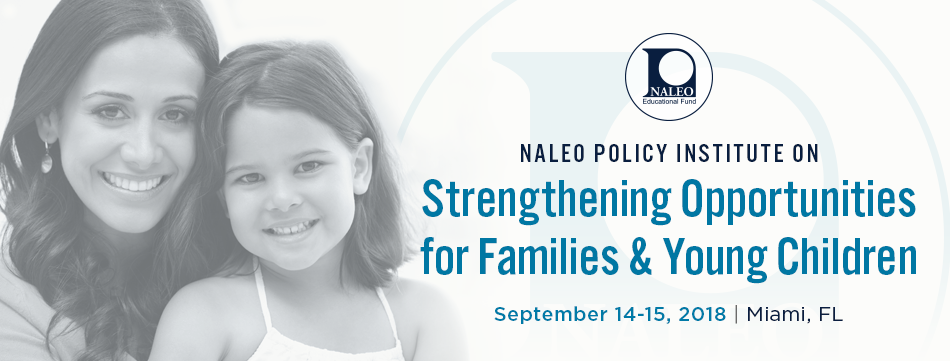
About
September 14-15, 2018 | Miami, FL
It is projected that by 2020 more than one in four children living in the United States will be Latino. A number of recent developments in our country, like the displacement of Puerto Rican families due to Hurricane Maria and the separation of families in our southern borders, provide states the opportunity to lead by addressing new and ongoing challenges faced by Latino children and families. States are in a unique position to formulate innovative approaches and policy solutions that can meet the needs and support the success of working Latino families and their young children. In this Policy Institute, state legislators deepened their understanding of current policies and social safety net programs to understand the impact these policies and programs have on working Latino families with young children.
One such change that states will need to understand is how the Tax Cuts and Jobs Act (TCJA) federal amendment of the Internal Revenue Code will alter individual states’ tax rates, deductions, credits, and safety net programs. As a critical component of family economic success, this federal amendment and how states will respond has the potential to affect the incomes of working families with young children.
The Institute’s curriculum covered:
- The State of Young Latino Children and their Families
- TCJA 101: Overview of the New Federal Tax Law and What It Means for States and Working Families
- Tax Credits for Working Families Part I: Earned Income Tax Credit
- Tax Credits for Working Families Part II: Leveraging Tax Credits for Child Care
- Workforce Development: Reskilling and Upskilling for Social Mobility
- Addressing the Health Needs of Working Families and Young Children: Medicaid and CHIP
- Critical Safety Nets for Working Families and Young Children
This convening provided state legislators with the enhanced capacity and governance skills they need to become effective advocates for their children, families, and communities. Participants attending this two-day convening heard from leading experts who shared the latest research and best practices regarding pressing policy matters that influence the future of families with young children.
Sponsors
Title Sponsors


For more information please contact:
Melina Pérez
Program Coordinator
NALEO Educational Fund
Tel: (213) 747-7606 ext 4454
Email: [email protected]
Schedule
- Friday, September 14
- Saturday, September 15
7:30 a.m. – 8:30 a.m.
Trade Room Foyer, Lobby Level
Registration
7:30 a.m. – 8:30 a.m.
Brickell Room, Lobby Level
Breakfast
8:30 a.m. – 9:00 a.m.
Trade Room, Lobby Level
Welcome Remarks
• Mr. Arturo Vargas, Chief Executive Officer, NALEO Educational Fund
9:00 a.m. – 11:00 a.m.
Trade Room, Lobby Level
Session I:
Part I: The State of Young Latino Children and their Families
As the United States continues to become more diverse, Latinos are a driving force behind this demographic shift. Nationally, Latinos are the second largest demographic in the zero-to-eight age cohort. This means that the role of the Latino community in shaping our country’s future economic and civic strength and prosperity is more significant than ever. In the first part of this session, policymakers received an overview of demographic shifts and trends nationally and across specific regions and the various indicators that support the success of children and their families in communities across the country.
• Dr. Mark Mather, Associate Vice President, U.S. Programs, Population Reference Bureau (PRB)
PRESENTATION | AUDIO
• Ms. Laura Speer, Associate Director, Policy Reform and Advocacy, The Annie E. Casey Foundation
PRESENTATION
Additional Resource: 1
Part II: The State of Young Latino Children and Building Resilience
With one million new neural connections formed every second, the first few years of a child’s life are critical in building the architecture of the brain that is vital to lifelong success. Stable home environments and quality interactions serve as the precursor for school readiness and the overall healthy physical, social, and educational development of children. Conversely, as highlighted by recent events, exposure to significant adversity, such as poverty, family separation, and natural disasters, in the early years can have lasting negative impacts and impair children’s development. In the second part of this session, participants received an overview of how challenges facing young Latino children today can affect their development and identified strategies to build resilient and supportive family environments in the face of adversity.
Session Chair: Hon. José Javier Rodríguez, Florida State Senator
• Dr. Sarah Roseberry Lytle, Director of Outreach and Education, Institute for Learning and Brain Sciences, University of Washington
Resource: 1
Additional Resources: 1 | 2 | 3
11:00 a.m. – 12:00 p.m.
Trade Room, Lobby Level
Session II:
TCJA 101: Overview of the New Federal Tax Law and What It Means for States and Working Families
The passage of the Tax Cuts and Jobs Act (TCJA) has resulted in the most significant reform of the federal tax code in a decade. Changes in federal tax law have historically informed states’ decisions in defining their own tax systems, and states have often entrusted the federal tax system to provide assistance to low-income working families through tax incentives. To ensure that state budgets reflect the needs and priorities of their states, it is critical that policymakers have a deep understanding of the nuances embedded in the new federal tax law that will affect working families with young children. In this session, participants were guided through key provisions in the new federal tax law and enhanced their knowledge of its bearing on their revenues and on the economic security of the families they represent.
• Ms. Elaine Maag, Senior Research Associate, Tax Policy Center, Urban Institute
PRESENTATION
• Mr. Richard C. Auxier, Research Associate, Tax Policy Center, Urban Institute
PRESENTATION
12:00 p.m. – 1:30 p.m.
Brickell Room, Lobby Level
Florida Best Practices Plenary and Luncheon
Opening Remarks:
• Hon. Francis X. Suarez, Mayor, City of Miami, Florida
Moderator: Mr. Arturo Vargas, Chief Executive Officer, NALEO Educational Fund
• Hon. Francis X. Suarez, Mayor, City of Miami, Florida
• Hon. Bryan Avila, Florida State Representative
Additional Resource: 1
1:30 p.m. – 3:00 p.m.
Trade Room, Lobby Level
Session III:
Tax Credits for Working Families Part I: Earned Income Tax Credit
The Earned Income Tax Credit (EITC) is one of the largest federal income support programs and reaches more than 25 million families across the country each year. Research demonstrates that the EITC yields short-term and long-term benefits that move families towards economic security, such as promoting work, encouraging asset building and savings, and increasing educational attainment of their young children. Meanwhile, some policymakers have leveraged the tax code of their own states to establish and expand access to State EITCs to lift more families out of poverty and help parents meet their children’s needs. This session will provide participants with a deeper understanding of the current parameters of EITC in the context of the new federal tax law and demonstrate best practices and innovative solutions states can build on to increase access to EITC.
• Dr. Jacob Bastian, Post-Doctoral Scholar, Harris School of Public Policy, University of Chicago
PRESENTATION | AUDIO
• Mr. Rich Williams, Program Manager, National Conference of State Legislatures (NCSL)
PRESENTATION | AUDIO | Resource: 1
3:00 p.m. – 4:30 p.m.
Trade Room, Lobby Level
Session IV:
Tax Credits for Working Families Part II: Leveraging Tax Credits for Child Care
Enacted in 1997, the Child Tax Credit (CTC) serves as a tax credit and a key lever through which the tax code can boost incomes of families contending with the costs of raising young children. Likewise, the Child and Dependent Care Tax Credit (CDCTC) assists families in meeting the expenses of child or dependent care that enable adult caregivers to work. Numerous states have also implemented these tax credits in their own tax systems to support working parents, leading to education and health gains for their children. With the amendment of the federal tax code, TCJA increased the nonrefundable Child Tax Credit and significantly limits the eligibility of immigrant families and children to participate and receive the benefits of these credits. This session provided an overview of the modifications to these credits under the new tax law and highlighted model states, like Louisiana, that have utilized their own tax provisions to offset child care expenses and promote access to quality care.
• Ms. Amy Matsui, Senior Counsel and Director of Income Security, National Women’s Law Center (NWLC)
PRESENTATION | AUDIO
• Ms. Jackie Vimo, Economic Justice Policy Analyst, National Immigration Law Center (NILC)
PRESENTATION | AUDIO
National Women’s Law Center (NWLC) Resources: 1 | 2 | 3
4:30 p.m. – 4:35 p.m.
Trade Room, Lobby Level
Evaluations
4:35 p.m. – 5:00 p.m.
Trade Room, Lobby Level